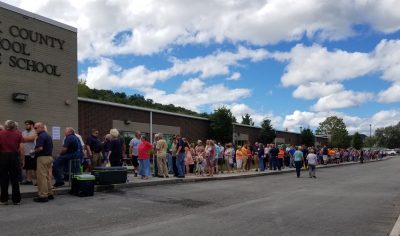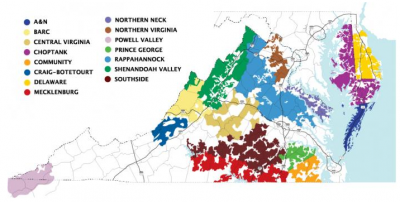Front Porch Blog
Is your electric provider one of Virginia’s 13 rural electric cooperatives? If so, you have a unique role to play in your local energy system! Democratic member control is one of seven core principles intended to guide the operation of electric cooperatives. Accordingly, the National Rural Electric Cooperative Association (NRECA) defines cooperatives as “democratic organizations” whose members “actively participate in setting policies and making decisions.” In addition, NRECA charges members (or member-owners) with holding elected co-op boards accountable across their cooperative’s service territory.
Want to learn more?
Email me at Emily [at] appvoices.org
Holding your board accountable helps you ensure that your co-op provides clean, equitable and affordable energy Ultimately, decisions made by co-op boards determine your electric rates and how “clean” your energy system is.
Your board sets co-op policy and budgets, oversees capital investments and long-term power contracts, and influences business management aspects of your cooperative. Board members also make important decisions about whether member-owners can access weatherization programs, can participate in rooftop solar net-metering programs (the billing system that most folks with solar panels use to stay plugged into the grid), and even whether pesticides should be sprayed to manage vegetation around power lines on members’ property.
Ultimately, decisions made by co-op boards determine your electric rates and how “clean” your energy system is.
The decisions that shape these policies, and ultimately our electric rates, are complex and often obscured from the public. And yet, they have big implications for local economies, personal finances, the health of local communities, and for our environment as a whole.
Let’s return to democratic member control. Member involvement is critical to good governance within electric co-ops, though it requires time and energy. Democratic participation doesn’t mean that members are on the hook for making everyday management decisions or that they must be savvy with the ins-and-outs of utility policy. Rather, democratic member control means that members should:
- Have the unimpeded ability to elect a board they trust to make judicious, objective decisions with the best interest of co-op member-owners in mind;
- Be able to attend board meetings;
- Have access to financial and business information regarding the management of their co-op;
- Be able to assert their needs to the board at regular or annual meetings; and
- Be able to modify co-op functioning through amendments to the co-op’s bylaws.
In short, democratic member control should provide transparent avenues by which co-op member-owners can involve themselves in the governance of their electric utility. By the same token, co-ops should encourage member-owner participation by making such processes clear and accessible.
But many co-ops haven’t made democratic participation easy. In fact, there are lots of examples from across Virginia and the U.S. of co-ops actively limiting the ability of member-owners to stay abreast of cooperative operations. Some co-ops have barred members from attending routine board meetings. Others have implemented obscure methods by which the public can request to attend a board meeting — but that doesn’t mean public access is even guaranteed. Still others have simply made it difficult for member-owners to learn when or where such board meetings take place.
One reason our cooperatives operate more like privately owned utilities than democratically governed ones has to do with poor voter turnout. The Institute for Local Self-Reliance reports that the majority of electric co-ops across the U.S. see fewer than 10% of their members vote in annual elections. A “business-as-usual” model pervades cooperatives in part because member-owners themselves don’t participate in the management of their utility; thus, co-op boards have had little incentive to modernize their energy systems or further democratize their business models.

1,254 PVEC member-owners attended the co-op’s 2018 annual meeting, double the turnout from the previous year due to turnout efforts by citizen advocates.
A first step in transforming your co-op would be to attend its annual meeting and to vote in co-op elections. Board elections are typically held at these annual meetings, which should be open for member-owners (like you!) to attend. Review your co-op’s annual report, which should provide information about its investments, expenditures and overall revenue. If the annual report isn’t published on your co-op’s website as it should be, then you have the right to request access to the important information it contains. Other relevant information, like the type of fuels your co-op relies on, what energy savings programs it has, and news about broadband internet options or solar accessibility may also be found in your cooperative’s annual report or website. If it isn’t, as a member-owner, you have the right to ask for it. If you want to go further, request a copy of your co-op’s bylaws. These will tell you what additional rights you have to participate in the management of your co-op.
Ultimately, transparency and democratic governance are the bedrocks of a cleaner, fairer and more affordable energy system! This foundation depends on you.
PREVIOUS
NEXT

Leave a comment
Your email address will not be published. Required fields are marked *

